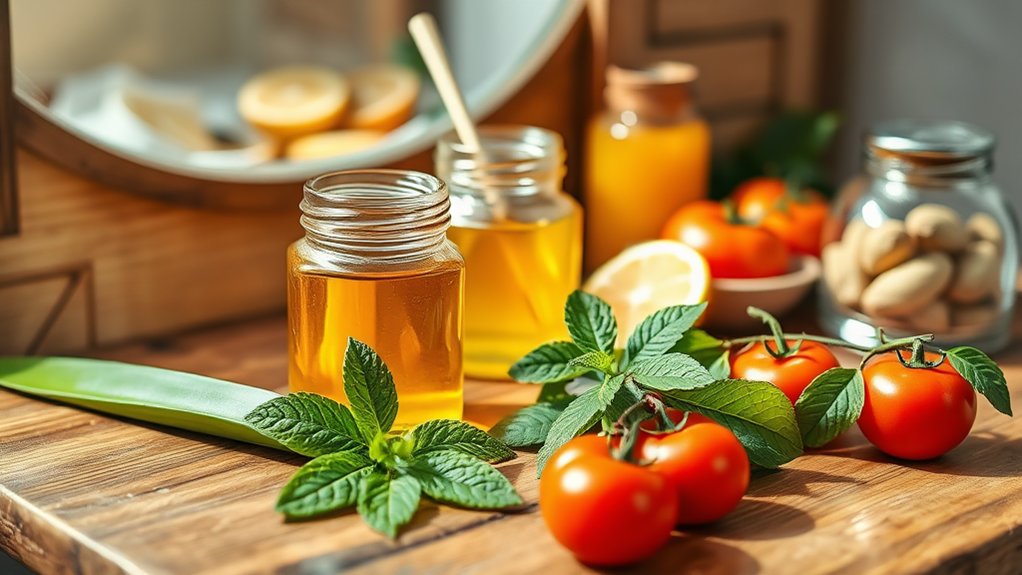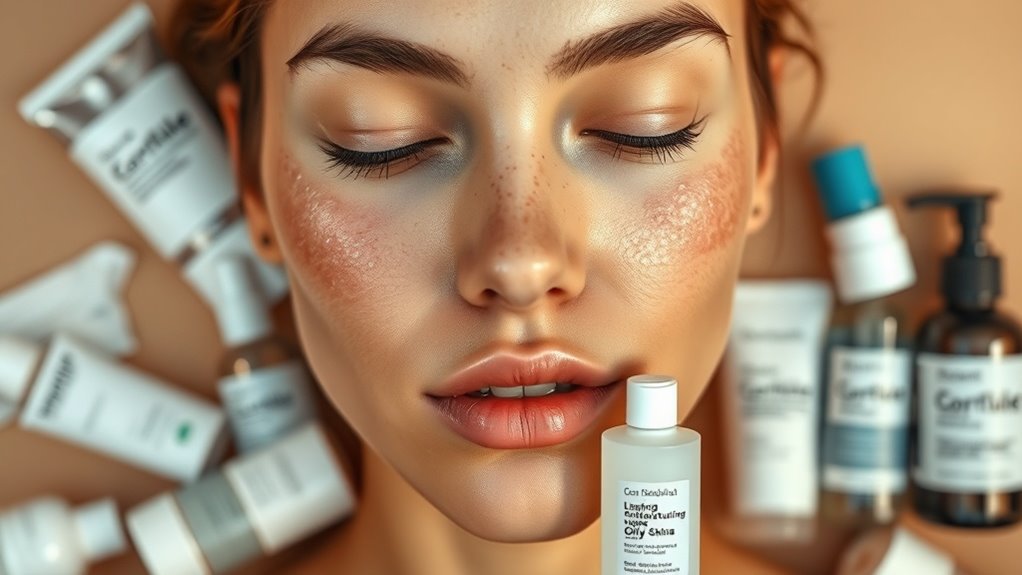No More Oily Skin! My Favorite Natural Remedies That Actually Work
If you’re struggling with oily skin, you’re not alone. The causes can range from genetics to hormonal fluctuations. Fortunately, natural remedies like witch hazel and aloe vera show promise in managing excess oil and improving skin texture. Many people have found success with these approaches, but it’s essential to understand how and why they work. Let’s explore effective strategies that can transform your oily skin and reveal a more balanced complexion.
Key Takeaways
- Use witch hazel as a natural astringent to reduce oil production and tighten pores effectively.
- Apply clay masks weekly to absorb excess oil and detoxify the skin for a smoother texture.
- Incorporate aloe vera for hydration and to balance oil levels without clogging pores.
- Consider tea tree oil for its antimicrobial properties to combat acne and regulate oiliness.
- Unrefined coconut oil can maintain moisture balance and reduce redness without increasing oiliness.
Understanding Oily Skin: Causes and Characteristics
Understanding oily skin begins with recognizing its causes and characteristics. Oily skin results from overactive sebaceous glands producing excess sebum. Hormonal changes, genetics, and environmental factors contribute to this condition.
You may notice enlarged pores, a shiny complexion, and increased susceptibility to acne. Identifying these traits is crucial for selecting effective natural remedies for oily skin. Ingredients like tea tree oil and witch hazel can help regulate oil production while providing antibacterial benefits.
Moreover, maintaining a balanced skincare routine will enhance your skin’s texture and overall health, leading to a clearer, less oily appearance. Incorporating natural remedies into your daily regimen can significantly improve the management of oily skin.
Natural Astringents: Harnessing the Power of Witch Hazel and Aloe Vera
To effectively manage oily skin, incorporating natural astringents like witch hazel and aloe vera can significantly benefit your skincare routine.
Witch hazel, a powerful plant extract, contains tannins that reduce excess oil production and tighten pores, enhancing your skin’s texture. Studies indicate it also possesses anti-inflammatory properties, calming redness and irritation.
Aloe vera, known for its soothing effects, offers additional hydration without clogging pores. Its natural astringent properties help balance oil levels, making your skin feel fresh without dryness. Additionally, using natural remedies consistently can lead to long-term improvements in your skin’s overall balance and appearance.
Clay Masks: Detoxifying and Absorbing Excess Oil
Although oily skin can be challenging to manage, incorporating clay masks into your skincare routine can provide effective relief.
Clay masks, particularly those containing bentonite or kaolin, detoxify your skin and absorb excess oil. Here’s why they’re beneficial:
-
Oil Absorption: Clay effectively absorbs sebum, reducing shine.
-
Detoxification: It draws out impurities and toxins, improving skin clarity.
-
Pore Minimization: Regular use can reduce pore size by preventing clogging.
-
Exfoliation: Clay masks gently exfoliate, promoting cell turnover and a smoother texture.
Integrating clay masks weekly can significantly enhance your oily skin management. Additionally, natural ingredients such as tea tree oil can further enhance the effectiveness of clay masks in combating oiliness.
Coconut Oil: A Surprising Ally for Oily Skin
Coconut oil, a versatile ingredient known for its various health benefits, can surprisingly be effective for managing oily skin.
Despite its oily nature, this oil contains medium-chain fatty acids, such as lauric acid, which has antimicrobial properties that can combat acne-causing bacteria. Regularly applying coconut oil can help maintain your skin’s moisture balance without triggering excess oil production.
Plus, its anti-inflammatory properties reduce redness and irritation often associated with oily skin. When using coconut oil, opt for unrefined, organic varieties to maximize its efficacy. Additionally, coconut oil’s beauty uses extend beyond skincare, making it a multi-functional product for your beauty routine.
Always do a patch test to ensure you won’t experience any adverse reactions.
Essential Oils: Balancing Skin With Nature’s Best Solutions
When it comes to managing oily skin, essential oils offer natural, effective solutions that can help restore balance.
Here are four oils you should consider incorporating into your routine:
-
Tea Tree Oil: Known for its antimicrobial properties, it can reduce acne and excess oil production.
-
Lavender Oil: Helps regulate sebum production while soothing inflammation.
-
Lemon Oil: Offers astringent properties that tighten pores and combat excess oiliness.
-
Peppermint Oil: Provides a cooling effect and helps balance skin’s oil levels.
Using these oils may enhance your skin’s appearance and promote overall health. Additionally, using oil can actually benefit oily skin by balancing moisture levels.
Always dilute before applying.





